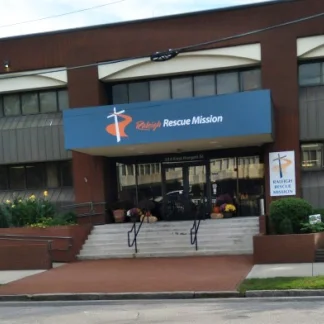Anns Haven of Rest
Anns Haven of Rest is a private rehab located in Raleigh, North Carolina. Anns H...
Raleigh Rescue Mission is a drug and alcohol rehab and community outreach organization in Raleigh, NC. They provide inpatient addiction treatment for men, women, and families.
This organization offers faith-based inpatient addiction treatment and shelter to individuals experiencing substance use disorder, homelessness, and poverty.
Raleigh Rescue Mission offers a variety of services that help men, women, and families gain stability and rebuild their lives. The treatment path is called the New Life Plan, which consists of six phases. Phases one through four are when clients live at the Mission, address physical and medical needs, develop a plan for sobriety and stability, employment preparation, skills and job training, and money management training. Phases five and six prepare individuals for transitional and long-term housing and offer ongoing counseling support. The basis for this program is that each person has sacred value and is created in the image of God, and through the love of Jesus, the Mission helps each person find their spiritual and practical purpose in life.
Contact us for more information: (919) 828-9014

Connect with Raleigh Rescue Mission by calling their admissions team directly.
(919) 828-9014 Website Get DirectionsGroup therapy is any therapeutic work that happens in a group (not one-on-one). There are a number of different group therapy modalities, including support groups, experiential therapy, psycho-education, and more. Group therapy involves treatment as well as processing interaction between group members.
In individual therapy, a patient meets one-on-one with a trained psychologist or counselor. Therapy is a pivotal part of effective substance abuse treatment, as it often covers root causes of addiction, including challenges faced by the patient in their social, family, and work/school life.
Life skills trainings involve all the skills a person must have in order to function successfully in the world. These include time management, career guidance, money management, and effective communication. Truly successful addiction recovery is based on the ability to not only live substance-free, but to thrive. Life skills teaches the practical necessities of functioning in society, which sets clients up for success in life, and therefore sobriety.
In individual therapy, a patient meets one-on-one with a trained psychologist or counselor. Therapy is a pivotal part of effective substance abuse treatment, as it often covers root causes of addiction, including challenges faced by the patient in their social, family, and work/school life.
Life skills trainings involve all the skills a person must have in order to function successfully in the world. These include time management, career guidance, money management, and effective communication. Truly successful addiction recovery is based on the ability to not only live substance-free, but to thrive. Life skills teaches the practical necessities of functioning in society, which sets clients up for success in life, and therefore sobriety.
Life skills trainings involve all the skills a person must have in order to function successfully in the world. These include time management, career guidance, money management, and effective communication. Truly successful addiction recovery is based on the ability to not only live substance-free, but to thrive. Life skills teaches the practical necessities of functioning in society, which sets clients up for success in life, and therefore sobriety.
Anns Haven of Rest is a private rehab located in Raleigh, North Carolina. Anns H...
Cottage Home Care is a private rehab located in Raleigh, North Carolina. Cottage...
Custom Home Care and Rehabilitation is a private rehab located in Raleigh, North...
Alcoholics Anonymous is an international fellowship of men and women who have ha...